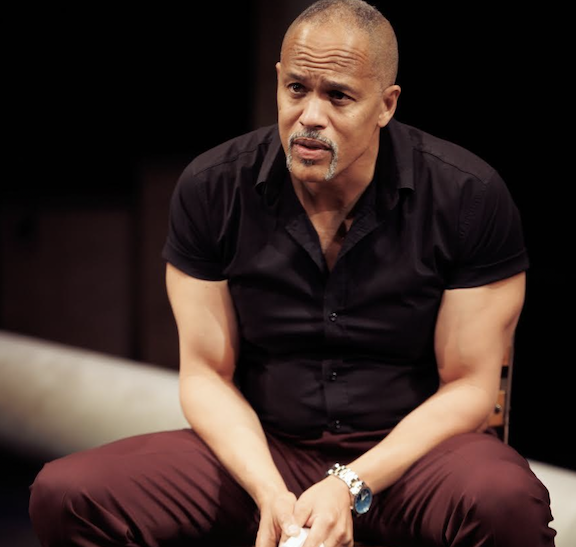'American Moor' at Karamu House Powerfully Examines How Black Actors Have Been Muted and Ignored
By Christine Howey on Fri, May 13, 2022 at 10:22 am
[
{
"name": "Ad - NativeInline - Injected",
"component": "38482495",
"insertPoint": "3",
"requiredCountToDisplay": "5"
},{
"name": "Real 1 Player (r2) - Inline",
"component": "38482494",
"insertPoint": "2/3",
"requiredCountToDisplay": "9"
}
]
In his role as the Grand Inquisitor of Spain, Tomas de Torquemada was pretty handy with various tortures, such as an early version of waterboarding. But he missed a trick by not including actor auditions in his evil menu of torments. An audition is a place where an actor signs up to lay his or her soul on the table and then be criticized, judged, and usually rejected.
That is one of the several things that is made clear in American Moor, written and performed with stunning clarity by Keith Hamilton Cobb. Now at Karamu House, this almost-one-person performance, directed by Kim Weild, uses an actor's audition as a metaphor for the muted and often ignored voice of Black actors in the American theater in general, and in Shakespeare's "Othello" in particular.
While only Cobb appears on stage, there is another presence in the room, the director (Josh Tyson) who sits in the audience and indicates how he'd like Cobb to perform the audition scene. It is made clear that the director, a couple decades younger and white, does not have a clue about what this actor is capable of bringing to the role.
The play is built around two conversations, the one Cobb has with the director and the much more interesting one going on inside Cobb's head, indicated on stage by lighting changes. In his interior moments, Cobb tries to accommodate the director's, um, guidance while simmering with rage against the dehumanizing process of auditions and the gulf between him and the white man who will decide his immediate future as a potential cast member. As Cobb says, "A little white man is asking me if I have any questions about playing a large Black man. No, but you should have questions for me!"
The six-foot-four Cobb is an imposing presence, and he doesn't shrink from that while adding his blazing erudition and understanding of Othello—not just the play but also the man, the Moor who is a general in the army of Venice and a man of towering eloquence and insecurities.
Cobb the playwright blends quotes from the play with his own ruminations about being a Black man working in a theater world where systemic racism is part of the ocean he swims in. When the director bids Cobb to be open to his suggestions, Cobb thinks, "When white people say, 'Be open,' they mean 'See it my way.'"
The 95-minute one-act is engrossing from the start, even if there are moments so loaded with glorious syntax and turns of phrase that you wish you could hit pause and reflect for a moment. On top of that, Cobb's performance is like a stripped and throbbing nerve ending that will not rest easy, and that can feel uncomfortable. But who said a play was supposed to make you feel good, it's supposed to make you feel.
And Cobb achieves that. Like all Black people, he is beset by whites who are unable to imagine a world that doesn't include their own privilege. That extends to the entitlement of telling a Black man how to act like himself.
This is shown in the rage that Cobb feels when the director, in reference to his performance, suggests that "a little obsequiousness might not be a bad thing." Cobb feels himself a boy who has grown into a Black man, powerful and impetuous with a warrior heart, and he refuses to put that aside.
The result is a play that sparks with passion and pain‚ along with quite a few laughs when Cobb relaxes into some street vernacular to express his frustration. He also shyly admits that, "I slung a little decent Shakespeare in my day." And for current directors out there, he has a bit of advice: "Pick the actor that scares you the most."
Indeed, American Moor slings some decent Shakespeare, and is a play you should probably see more than once to get the full effect. But one viewing is absolutely mandatory.
American Moor
Through May 29 at Karamu House, 2355 E. 89 St., karamuhouse.org, 216-795-7070.
SCENE Supporters make it possible to tell the Cleveland stories you won’t find elsewhere.
Become a supporter today.
About The Author
Christine Howey
Christine Howey has been reviewing theater since 1997, first at Cleveland Free Times and then for other publications including City Pages in Minneapolis, MN and The Plain Dealer. Her blog, Rave and Pan, also features her play reviews. Christine is a former stage actor and director, primarily at Dobama Theatre...
Scroll to read more Arts Stories & Interviews articles
Newsletters
Join Cleveland Scene Newsletters
Subscribe now to get the latest news delivered right to your inbox.














